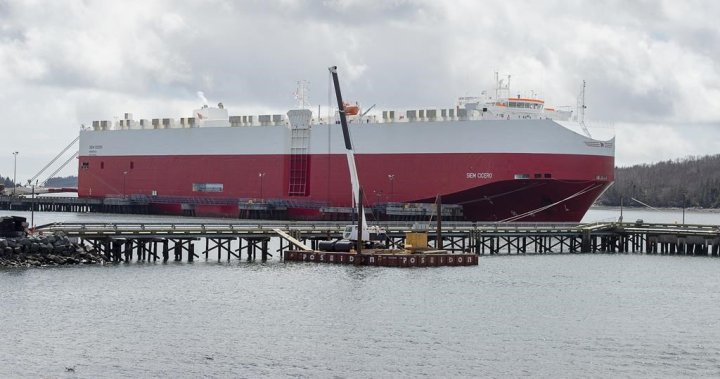After several weeks of striking, over 230 unionized workers at the CN Autoport facility in Eastern Passage, Nova Scotia have ratified a three-year collective agreement, officially bringing an end to the labor dispute. The agreement includes wage increases each year, as well as lump-sum bonuses in the first two years. Additionally, there will be an extra paid personal day, improvements to vacation policies, pensions, and the cost of benefits for the workers. This agreement comes after a tentative agreement was announced late Tuesday, with union members voting to accept it earlier on Wednesday. Autoport, a subsidiary of CN Rail, is known as one of the busiest facilities of its kind in North America, handling around 185,000 vehicles annually.
The strike at the transshipment facility near Halifax began in late February, with union members demanding better working conditions and compensation. By ratifying the three-year collective agreement, the union members have achieved their goal of securing wage increases and other improvements. The agreement will provide stability for the workers over the next three years, ensuring that their wages keep pace with inflation and that their benefits are enhanced. This successful resolution is a positive outcome for both the workers and the company, as it allows operations to resume at the facility without further disruptions.
Unifor, the union representing the workers at the CN Autoport facility, played a crucial role in negotiating the terms of the collective agreement with management. The union’s advocacy for its members led to the inclusion of wage increases, lump-sum bonuses, an additional paid personal day, and enhancements to vacation, pensions, and benefits in the agreement. By standing in solidarity and advocating for their rights, the union members were able to secure a fair and favorable agreement that addresses their concerns and meets their needs. This successful negotiation highlights the importance of collective bargaining in protecting workers’ rights and ensuring fair treatment in the workplace.
The CN Autoport facility in Eastern Passage, Nova Scotia, is a key transshipment hub for vehicles in North America, handling a significant volume of cars every year. With operations back on track following the resolution of the strike, the facility can resume its essential role in the transportation and logistics industry. The successful ratification of the collective agreement between the unionized workers and management sets a positive precedent for labor relations at the facility, fostering a more cooperative and collaborative working environment. By resolving their differences through negotiation and compromise, both parties have demonstrated a commitment to finding mutually beneficial solutions.
The conclusion of the strike at the CN Autoport facility represents a victory for the union members who stood together in solidarity to fight for their rights and achieve fair treatment in the workplace. The successful negotiation of the collective agreement demonstrates the power of collective action and the importance of unions in advocating for workers’ interests. By securing wage increases, bonuses, and improved benefits, the union members have established a more favorable working environment for themselves and future generations of workers at the facility. This outcome underscores the significance of organized labor in protecting the rights and welfare of workers in the face of economic challenges and labor disputes.
In summary, the resolution of the weeks-long strike at the CN Autoport facility near Halifax through the ratification of a three-year collective agreement marks a significant achievement for the unionized workers and management. The agreement includes wage increases, bonuses, and improvements to benefits, providing stability and security for the workers over the next three years. The successful negotiation of the agreement highlights the importance of collective bargaining in addressing workers’ concerns and ensuring fair treatment in the workplace. With operations back on track at the facility, both the union members and the company can move forward in a more cooperative and productive manner, setting a positive example for labor relations in the industry.


